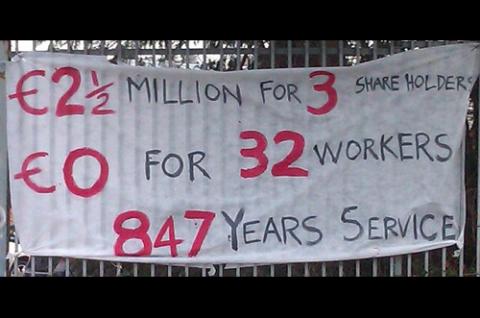'We have a human rights issue at Vita Cortex'

I remember reading an interview with Otto Frank, the father of a young girl whose diary changed, forever, the way the world viewed human suffering. In the interview he uttered the poignant words, “I believe that it’s everyone’s responsibility to fight prejudice.”
Prejudice (noun) 1.unreasonable feelings, opinions, or attitudes, especially of a hostile nature
It wasn’t until some of the workers on the sit-in started to become ill, one with pneumonia, that the gravity of his words resurfaced in my mind. It hit me. The Vita Cortex situation is one that is steeped in prejudice - the prejudice of the “haves” such as Jack Ronan and Sean McHenry towards the so-called “have-nots” such as my Dad and his co-workers. The unreasonable feeling shown by the company owners towards a group of human beings, who have always worked hard for them, has been disgusting. Their antipathy towards ordinary people, who they clearly see as little more than a disposable resource, has led to members of our community, sleeping on a cold factory floor with the mice.

The factory floor: The sleeping area at Vita Cortex.
When good, decent men like Henry O’Reilly become sick as a result of such treatment, then a line has been crossed. It has not only been crossed, it is a dot in the road. When anybody becomes sick because of having to fight day and night simply to secure their basic entitlements, you have a human rights issue. We have a human rights issue at Vita Cortex.
The constitution of the World Health Organisation states that “the enjoyment of the highest attainable standard of health is one of the fundamental rights of every human being.” The prejudice shown towards working people by these two “middle-class merchants”, as Yeats would have described them if it was still 1913, has violated the human rights of the Cortex 32.
If you are supporting the campaign, know this – you are standing in defence of human dignity. You have taken responsibility for fighting prejudice. This is sadly a story where its “once upon a time in land far, far away” reads “Today… in 2012…. in a land we all call home” and it is not a fairytale. Although it does have its villains in the form of the company owners, and it certainly has its heroes in these 32 workers.
If you have paid close attention you will see that the Cortex struggle has turned the understanding of the phrase “have and have-nots” on its head. The haves? My father and his friends on the sit-in. They have the respect, love, admiration and even gratitude of a nation for standing up and being counted. The have-nots? Well I hope Ronan and McHenry can sleep at night.
And to a certain point they have been allowed to get away with it. I cannot but question the moral values of a system that would leave 32 human beings virtually living in a factory, sleeping on slabs of foam, because they felt they had no other avenue by which to secure their rights. Anytime a person is threatened with the prospect of being stripped of their human dignity, we have a humanitarian problem. And we shouldn’t fool ourselves into thinking otherwise. A zero-tolerance policy on human degradation is the only policy worth having. We need to be quick in stamping out the spark of any attempt to dehumanise members of our community, lest it catch fire. And that should include holding wealthy businessmen to account when they attempts to exploit ordinary people.
The one thing that is clear to me is the huge difference between the moral fabric of the Cork and Irish public and that of the system under which we live. When I say ‘system’ I mean the mechanics of governance and our body of law and not necessarily the people who populate either. It is incumbent on all leaders, of every political perspective, to change it.
The public has stood with the exploited workers in Cork. The distinction, between system and society, is clear for all to see. As we move towards the LRC talks, I am once again reminded of the Franks and a few lines from of Anne’s diary “I keep my ideals because, in spite of everything, I still believe that people are really good at heart.”
We have suffered absolutely nothing in comparison to Anne Frank. The mere suggestion would be laughable. But Mr.Ronan, tomorrow you have, in my eyes, the opportunity to prove her sentiments on human nature right.
I hope you take it.
Veronica Marshall is from Fairhill and is a coordinator of the Support The Vita Cortex Workers online campaign. In recent weeks she has seen her father and his good friend Henry taken ill while on the sit-in.
This piece was originally published last Monday, 16 January, on the Support the Vita Cortex Workers site. Republished with permission.
Image top: Support the Vita Cortex Workers on Facebook.
